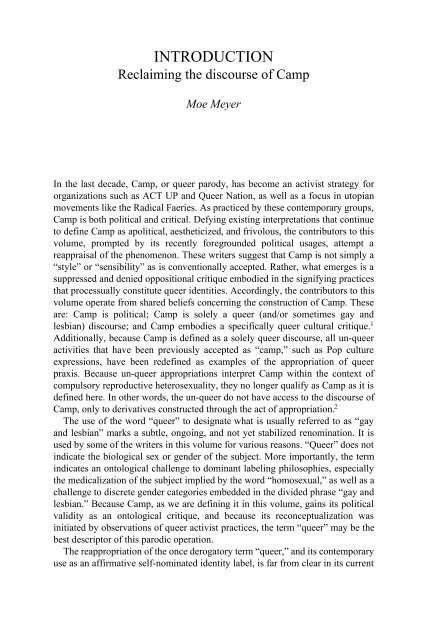Edited by Moe Meyer - Get a Free Blog
Edited by Moe Meyer - Get a Free Blog
Edited by Moe Meyer - Get a Free Blog
Create successful ePaper yourself
Turn your PDF publications into a flip-book with our unique Google optimized e-Paper software.
INTRODUCTION<br />
Reclaiming the discourse of Camp<br />
<strong>Moe</strong> <strong>Meyer</strong><br />
In the last decade, Camp, or queer parody, has become an activist strategy for<br />
organizations such as ACT UP and Queer Nation, as well as a focus in utopian<br />
movements like the Radical Faeries. As practiced <strong>by</strong> these contemporary groups,<br />
Camp is both political and critical. Defying existing interpretations that continue<br />
to define Camp as apolitical, aestheticized, and frivolous, the contributors to this<br />
volume, prompted <strong>by</strong> its recently foregrounded political usages, attempt a<br />
reappraisal of the phenomenon. These writers suggest that Camp is not simply a<br />
“style” or “sensibility” as is conventionally accepted. Rather, what emerges is a<br />
suppressed and denied oppositional critique embodied in the signifying practices<br />
that processually constitute queer identities. Accordingly, the contributors to this<br />
volume operate from shared beliefs concerning the construction of Camp. These<br />
are: Camp is political; Camp is solely a queer (and/or sometimes gay and<br />
lesbian) discourse; and Camp embodies a specifically queer cultural critique. 1<br />
Additionally, because Camp is defined as a solely queer discourse, all un-queer<br />
activities that have been previously accepted as “camp,” such as Pop culture<br />
expressions, have been redefined as examples of the appropriation of queer<br />
praxis. Because un-queer appropriations interpret Camp within the context of<br />
compulsory reproductive heterosexuality, they no longer qualify as Camp as it is<br />
defined here. In other words, the un-queer do not have access to the discourse of<br />
Camp, only to derivatives constructed through the act of appropriation. 2<br />
The use of the word “queer” to designate what is usually referred to as “gay<br />
and lesbian” marks a subtle, ongoing, and not yet stabilized renomination. It is<br />
used <strong>by</strong> some of the writers in this volume for various reasons. “Queer” does not<br />
indicate the biological sex or gender of the subject. More importantly, the term<br />
indicates an ontological challenge to dominant labeling philosophies, especially<br />
the medicalization of the subject implied <strong>by</strong> the word “homosexual,” as well as a<br />
challenge to discrete gender categories embedded in the divided phrase “gay and<br />
lesbian.” Because Camp, as we are defining it in this volume, gains its political<br />
validity as an ontological critique, and because its reconceptualization was<br />
initiated <strong>by</strong> observations of queer activist practices, the term “queer” may be the<br />
best descriptor of this parodic operation.<br />
The reappropriation of the once derogatory term “queer,” and its contemporary<br />
use as an affirmative self-nominated identity label, is far from clear in its current


